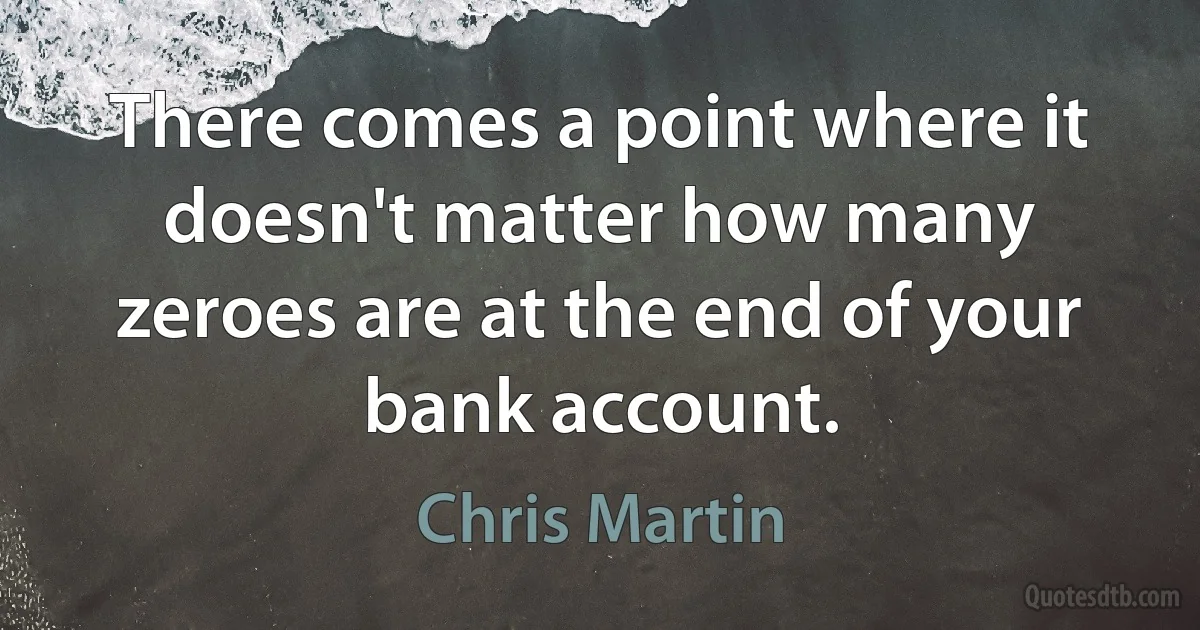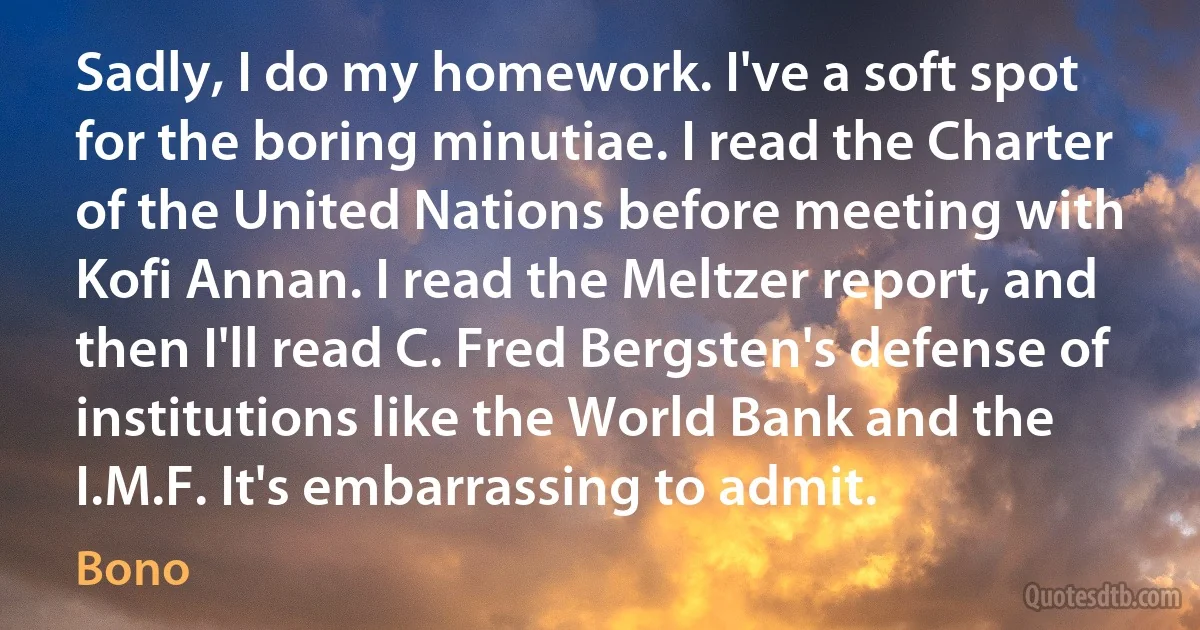Bank Quotes - page 28
One of the reasons inequality gets so deep in this country is that everyone wants to be rich. That's the American ideal. Poor people don't like talking about poverty because even though they might live in the projects surrounded by other poor people and have, like, ten dollars in the bank they don't like to think of themselves as poor.

Jay-Z
It is almost enough to make one's jaw drop to think that officials at the World Bank and the IMF would suggest that they have poverty alleviation in mind when they force governments to withdraw subsidies that enable poor people to get clean water to drink. If this is a policy aimed at helping the world's poor, it's interesting to imagine what a policy aimed at hurting the world's poor would look like.

Linda McQuaig
Like chewing gum or hair gel, water [according to the World Bank and IMF] is to be sold by the private sector at market rates. The needs of the people are all that's left out of this equation.... [A] World Bank document cites the "willingness to pay" on the part of the people in Ghana as evidence of their recognition of the "health benefits" of drinkable water. It's amazing, isn't it, how people are "willing" to pay huge amounts for things that they need in order to survive!

Linda McQuaig
Mike Stone was Portland's premier lawyer-if you were in deep, deep trouble. He took on clients other lawyers avoided-swim team coaches accused of child molestation, surgeons who had operated while three sheets to the wind, bank presidents caught embezzling millions...Just being defended by Stone was a sure sign that you were involved in something embarrassing or off-putting.

Lis Wiehl
How sweet the moonlight sleeps upon this bank Here will we sit, and let the sounds of music Creep in our ears soft stillness and the night Become the touches of sweet harmony. Sit, Jessica look, how the floor of heaven Is thick inlaid with patines of bright gold There's not the smallest orb which thou behold'st But in his motion like an angel sings, Still quiring to the young-eyed cherubins. Such harmony is in immortal souls But whilst this muddy vesture of decay Doth grossly close it in, we cannot hear it.

William Shakespeare
There's nothing like spending other peoples money, Gordon and Tony discovered this very quickly, and have been going crazy, ordering off the menu ever since. Tony quickly exited the restaurant, leaving Gordon footing the bill, and thats why we're in the mess we're in now. Meanwhile Tony's laughing all the way to the bank where his £14 million is sitting pretty. It's just disgraceful behaviour and ordinary people are suffering because of the megalomania of those two crooks.

Munir Butt
I went to Iraq because I wanted to see what one year of occupation had done to Iraqi society, and I went to the West Bank and Gaza Strip because I wanted to see what three generations of occupation had done to Palestinian society. I found a lot more hopelessness and despair in Palestine.

Michael Franti
Some people collect paperweights, or pre-Columbian figures, or old masters, or young mistresses, or tombstone rubbings, or five-minute recipes, or any of a thousand other things including bruises, most of them satisfying, depending on the genes and the bank account and where the heart lies.
My own collection is sunrises; and I find that they have their advantages. Sunrises are usually handsome, they can't possibly be dusted, and they take only a little room, so long as it has a window to see them from. Moreover, I can't give way to the urge to show off my collection to my friends. I can only talk about it, and they needn't listen.

Peg Bracken
I believe very strongly that we ought to support Israel; that it has a right to the land. This is the most important reason: Because God said so. As I said a minute ago, look it up in the Book of Genesis. It is right up there on the desk.In Genesis 13:14–17, the Bible says, "The Lord said to Abraham, 'Lift up now your eyes, and look from the place where you are northward, and southward, and eastward and westward: for all the land which you see, to you will I give it, and to your seed forever.... Arise, walk through the land in the length of it and in the breadth of it; for I will give it to thee.'" That is God talking.The Bible says that Abraham removed his tent and came and dwelt in the plain of Mamre, which is in Hebron, and built there an altar before the Lord. Hebron is in the West Bank. It is at this place where God appeared to Abram and said, "I am giving you this land - the West Bank."

James Inhofe
He did not practise law and so whatever money I earned, I just placed before him. He invested in business--trucks, cars--but lost everything. I could not bear to see him unhappy. Often he would disappear from home for months on end. The bank people would come and harass me, ask for my property as I was unable to repay the loans. This happened several times. I had to sell everything I had. I will never forget or forgive myself for not being by his bedside before he died. I had a programme in Bombay, but I did not want to go. He insisted because we needed the money. While I was performing, he died.

Gangubai Hangal
Two words of such a book, though possessing no peculiar signification, if met with in the dullest sentence, are enough: they call up, what has been finely termed, the "lightning of the mind." We feel an instantaneous kindness and reverence towards an author (together with a high opinion of his discrimination) who cites as it were the very language of our dreams-the secret converse of our own invisible spirit. We are almost startled at its being made public, and fancy that we have been at some time overheard reading. He is forthwith admitted a member of our heart's privy council. His hard words and bad reasoning are forgiven: we shut our ears to his angular periods-remembering only that his habits and desires, his sympathies, perceptions and enjoyments, are under the same master-key as our own-that he has struck into the same path, drank at the same brook, mused upon the same bank, and plucked almost the same leaf with ourselves.

Samuel Laman Blanchard
Since the rise of the Industrial Revolution in England, and then the invention of all of our gadgets and contrivances and all of the things and modern conveniences-we unconsciously left God behind. We didn't mean to do it. We just became so involved in getting our big bank accounts that we unconsciously forgot about God-we didn't mean to do it.

Martin Luther King Jr.
In a sense we've come to our nation's capital to cash a check. When the architects of our republic wrote the magnificent words of the Constitution and the Declaration of Independence, they were signing a promissory note to which every American was to fall heir.
This note was a promise that all men, yes black men as well as white men, would be guaranteed the inalienable rights of life, liberty, and the pursuit of happiness. It is obvious today that America has defaulted on this promissory note insofar as her citizens of color are concerned. Instead of honoring this sacred obligation, America has given the Negro people a bad check, a check which has come back marked "insufficient funds." But we refuse to believe that the bank of justice is bankrupt. We refuse to believe that there are insufficient funds in the great vaults of opportunity of this nation. And so, we've come to cash this check, a check that will give us upon demand the riches of freedom and the security of justice.

Martin Luther King Jr.
Both the existence of these parallels and their tragic nature would not have escaped Charles Kindleberger, whose World in Depression, 1929-1939 was published exactly 40 years ago, in 1973. Where Kindleberger's canvas was the world, his focus was Europe. While much of the earlier literature, often authored by Americans, focused on the Great Depression in the US, Kindleberger emphasised that the Depression had a prominent international and, in particular, European dimension. It was in Europe where many of the Depression's worst effects, political as well as economic, played out. And it was in Europe where the absence of a public policy authority at the level of the continent and the inability of any individual national government or central bank to exercise adequate leadership had the most calamitous economic and financial effects.

Barry Eichengreen
There are still films about bank robberies, but let's be honest, the biggest financial crimes today aren't happening in banks, they're happening on Wall Street. This is happening in the completely abstract datasphere. Capitalism is dependent upon this commodity of speed. Making a film about a bank robbery is maybe funny, but it's completely anachronistic. We have to tell the stories of the 21st century, specifically in a way that people can relate to it.

Johannes Grenzfurthner



